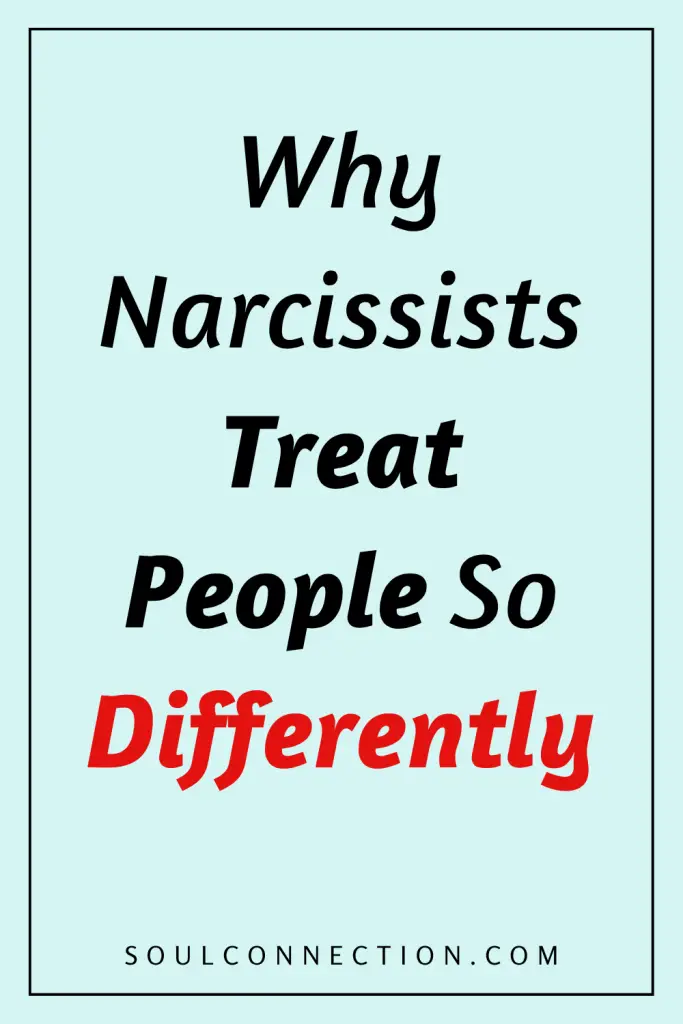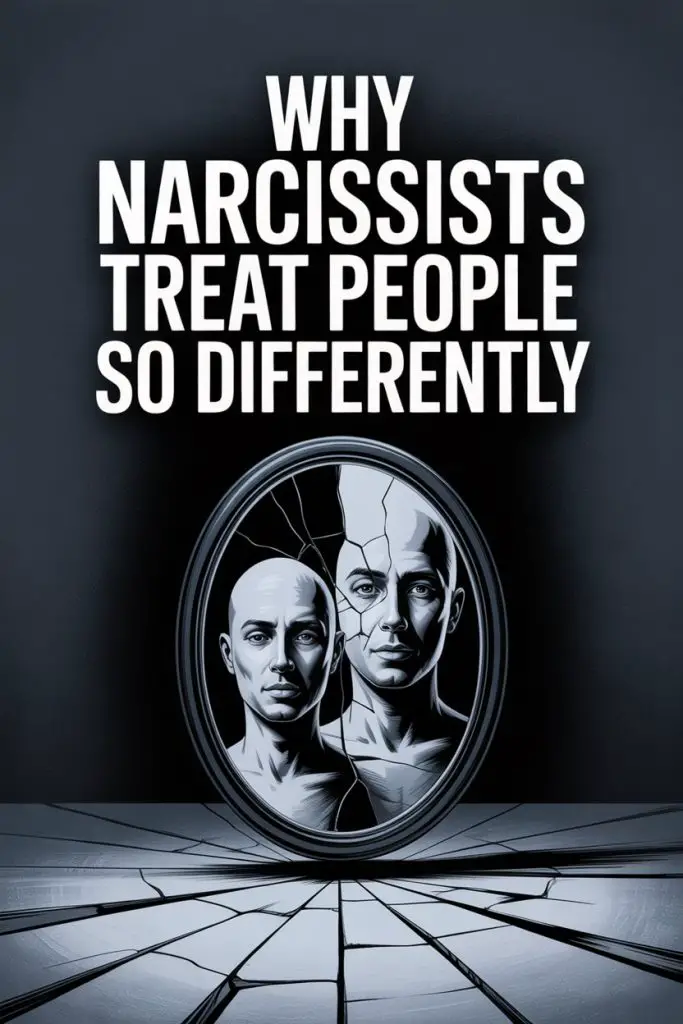Ever notice how a narcissist treats their boss like royalty, their partner like an employee, and the barista like wallpaper? If you’ve ever felt whiplash from the way a narcissist shifts gears between people, you’re not alone.
This isn’t garden-variety moodiness—there’s a method to the madness.
Let’s roll up our sleeves and get right into the nitty-gritty of why narcissists seem to have a different face for everyone in their orbit.
The Chameleon Effect
Narcissists aren’t just attention-seekers—they’re masterful social shapeshifters. Picture a chameleon at a disco: dazzling, adaptive, and entirely self-interested.
Unlike your average people-pleaser who just wants to keep the peace, the narcissist is reading the room and calculating exactly who deserves the red-carpet treatment and who gets left on read.
Their motivation? Supply. In narcissist-land, “supply” means ego-stroking, admiration, and control. Whoever offers the most, gets the best version of them (at least, temporarily).
Power Dynamics Are Everything
A narcissist zeroes in on social hierarchy faster than a seagull on a chip. The way they treat someone has a lot to do with where they perceive themselves on the social ladder compared to that person.
Social superiors? Expect charm, wit, and relentless flattery—the narcissist’s greatest hits. Social equals or “useful” acquaintances?
They’ll get a mixture of friendliness and manipulation, depending on what the narcissist stands to gain. Social inferiors or those who can’t boost their ego? Often ignored or dismissed, sometimes with a side of low-key cruelty.
It’s not about who you are, it’s about what you can do for them or how you make them feel about themselves. If that sounds transactional, well, it absolutely is.
The Mask Slips at Home
Ever notice how the person who gets the worst treatment from a narcissist is the one closest to them? Classic narcissist move.
Strangers and new acquaintances see charm and charisma, while partners, kids, and close friends are stuck with emotional hand-me-downs.
Why the difference? Familiarity breeds contempt, especially when the narcissist no longer feels the need to keep up appearances. The mask is for outsiders; the real face comes out once you’re hooked.
There’s also the thrill of power in hurting someone who loves them. It’s twisted, but feeding off another’s emotional reactions is a favorite pastime in the narcissistic playbook.
Rewards and Punishments
Think of narcissists as amateur dog trainers—except you’re the dog, and the rewards are sparse. They hand out love, praise, or attention when you serve their needs or shine a flattering light on them.
Fall out of favor, challenge their ego, or (heaven forbid) outshine them? Prepare for the cold shoulder or a full-blown tantrum.
This constant flip-flop keeps people guessing and, ironically, more attached. It’s intermittent reinforcement in action, and it’s as addictive as scrolling through your ex’s Instagram at 2 a.m.
Splitting People Into Categories
Black and white thinking is the narcissist’s bread and butter. People are either all good (admirers, enablers, sources of praise) or all bad (critics, competitors, boundary-setters).
This mental shortcut lets them quickly decide who deserves their best performance and who gets the boot.
Someone new in their life? Pedestal. Someone who sees through their nonsense? Pit. It’s not personal—it’s just how their mind works.
The Ever-Rotating Cast
Narcissists collect people like magpies collect shiny things, but newness fades fast. Once the initial high of a new admirer wears off, the narcissist gets bored or annoyed.
Cue the next dazzling entrance, and the cycle starts over.
This revolving door means people are constantly promoted or demoted according to the narcissist’s moods and needs. One day you’re the star, the next you’re yesterday’s news.
Trying to keep up will wear out your sneakers and your soul.
The Mirror, Not the Window
For narcissists, other people aren’t separate beings with their own feelings—they’re reflections. If you make them look good, they’ll treat you like gold. If you highlight their flaws, you’re out.
Empathy isn’t exactly their strong suit. Relationships are for validation, adoration, or use—not true connection. That’s why they struggle to treat people with consistent kindness or respect: it’s all about them, not you.
Why Some People Get the ‘Golden Child’ Treatment
Ever met someone who can do no wrong in a narcissist’s eyes? Maybe it’s a sibling, a co-worker, or an ex. These ‘golden children’ are usually the ones who reflect the narcissist’s fantasy self or make them look impressive.
They get all the praise, gifts, and affection. Until, of course, they step out of line.
But don’t be fooled—loyalty to a golden child is conditional. It’s all fun and games until the narcissist feels slighted. Then the golden child might find themselves suddenly demoted to scapegoat, wondering what just happened.
Why Others Get the Short End of the Stick
If you’re honest, have boundaries, or refuse to play the narcissist’s games, you’re public enemy number one. The narcissist may criticize, ignore, or undermine you. Sometimes they’ll even recruit others to join in the campaign.
Why the animosity? You threaten their carefully constructed self-image. Narcissists have a sixth sense for sniffing out people who see through them—and they don’t appreciate the exposure.
How to Use This Knowledge Tonight
Recognizing these patterns can be a game-changer. Here’s what you can put to use right away:
- Stop taking it personally. How a narcissist treats you says more about them than you.
- Don’t chase after their approval. If you find yourself bending over backward to win their “nice” side, take a breath and step back. You’re not a circus contortionist.
- Set clear boundaries. Narcissists respect strength, not weakness. Kindly but firmly hold your ground, even if it’s uncomfortable.
- Keep your circle tight. If you’re being treated like a placeholder rather than a person, invest in relationships where respect goes both ways.
- Pay attention to actions, not words. Narcissists are pros at saying the right thing, but it’s their patterns of behavior that reveal the truth.
When It’s Time to Rethink the Relationship
It can be tempting to believe you’ll finally land on the “good” side of a narcissist if you just try hard enough. Unfortunately, their treatment of you will always depend on what you can offer them in any given moment.
Today’s golden child is tomorrow’s scapegoat.
If this hits a little too close to home, know that you’re not alone and you’re not “too sensitive.” Narcissists are genuinely confusing to be around—by design.
Sometimes the healthiest move is to step off their merry-go-round altogether. There are people out there who’ll treat you well no matter who’s watching.
You Deserve Consistency
Life’s too short to keep decoding someone else’s mood swings. Knowing why narcissists treat people so differently won’t stop them from doing it—but it can stop you from wondering if it’s your fault.
You’re worthy of steady, genuine kindness. Not just from others, but from yourself. Give yourself the gift of not playing a rigged game.
And if you ever start to miss the drama, there’s always reality TV—at least those narcissists get paid for it.


